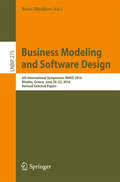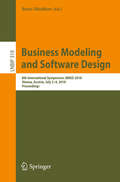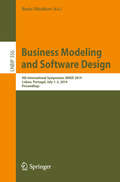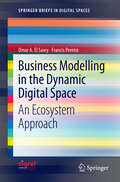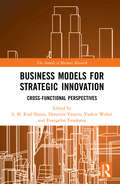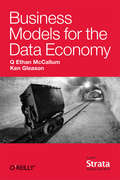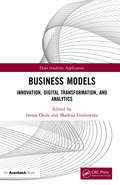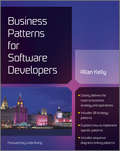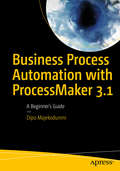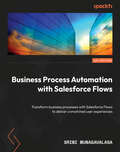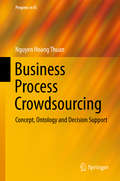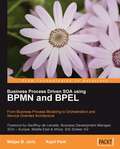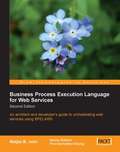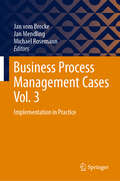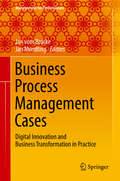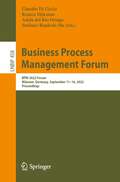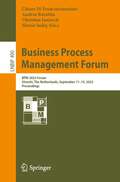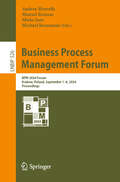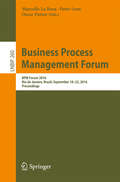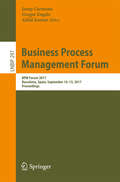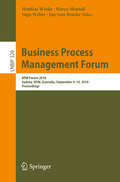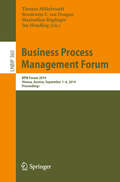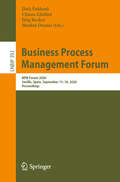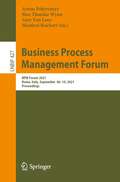- Table View
- List View
Business Modeling and Software Design: 6th International Symposium, BMSD 2016, Rhodes, Greece, June 20-22, 2016, Revised Selected Papers (Lecture Notes in Business Information Processing #275)
by Boris ShishkovThis book contains revised and extended versions of selected papers from the Fifth International Symposium on Business Modeling and Software Design, BMSD 2015, held in Milan, Italy, in July 2015. The symposium was organized and sponsored by the Interdisciplinary Institute for Collaboration and Research on Enterprise Systems and Technology (IICREST), being co-organized by Politecnico di Milano and technically co-sponsored by BPM-D. Cooperating organizations were Aristotle University of Thessaloniki (AUTH), the U Twente Center for Telematics and Information Technology (CTIT), the BAS Institute of Mathematics and Informatics (IMI), the Dutch Research School for Information and Knowledge Systems (SIKS), and AMAKOTA Ltd. BMSD 2015 received 57 paper submissions from which 36 papers were selected for publication in the BMSD'15 proceedings. 14 of those papers were selected as full papers. Additional post-symposium reviewing was carried out reflecting both the qualities of the papers and the way they were presented. 10 best papers were selected for the Springer edition (mainly from the BMSD'15 full papers). The 10 papers published in this book were carefully revised and extended (following the reviewers' comments) from the papers presented. The selection considers a large number of BMSD-relevant research topics: from business-processes-related topics, such as process mining and discovery, (dynamic) business process management (and process-aware information systems), and business process models and ontologies (including reflections into the Business Model Canvas); through software-engineering-related topics, such as domain-specific languages and software quality (and technical debt); and semantics-related topics, such as semantic technologies and knowledge management (and knowledge identification); to topics touching upon cloud computing and IT-enabled capabilities for enterprises.
Business Modeling and Software Design: 8th International Symposium, BMSD 2018, Vienna, Austria, July 2-4, 2018, Proceedings (Lecture Notes in Business Information Processing #319)
by Boris ShishkovThis book constitutes the proceedings of the 8th International Symposium on Business Modeling and Software Design, BMSD 2018, held in Vienna, Austria, in July 2018. The 14 full papers and 21 short papers selected for inclusion in this book deal with a large number of research topics: (i) Some topics concern Business Processes (BP), such as BP modeling / notations / visualizations, BP management, BP variability, BP contracting, BP interoperability, BP modeling within augmented reality, inter-enterprise collaborations, and so on; (ii) Other topics concern Software Design, such as software ecosystems, specification of context-aware software systems, service-oriented solutions and micro-service architectures, product variability, software development monitoring, and so on; (iii) Still other topics are crosscutting with regard to business modeling and software design, such as data analytics as well as information security and privacy; (iv) Other topics concern hot technology / innovation areas, such as blockchain technology and internet-of-things. Underlying with regard to all those topics is the BMSD’18 theme: Enterprise Engineering and Software Engineering - Processes and Systems for the Future.
Business Modeling and Software Design: 9th International Symposium, BMSD 2019, Lisbon, Portugal, July 1–3, 2019, Proceedings (Lecture Notes in Business Information Processing #356)
by Boris ShishkovThis book constitutes the refereed proceedings of the 9th International Symposium on Business Modeling and Software Design, BMSD 2019, held in Lisbon, Portugal, in July 2019. It contains 12 full and 11 short papers. BMSD is a leading international forum that brings together researchers and practitioners interested in business modeling and its relation to software design. Particular areas of interest are: Business Processes and Enterprise Engineering; Business Models and Requirements; Business Models and Services; Business Models and Software; Information Systems Architectures and Paradigms; Data Aspects in Business Modeling and Software Development; Blockchain-Based Business Models and Information Systems; IoT and Implications for Enterprise Information Systems. The theme of BMSD 2019 was: REFLECTING HUMAN AUTHORITY AND RESPONSIBILITY IN ENTERPRISE MODELS AND SOFTWARE SPECIFICATIONS.
Business Modelling in the Dynamic Digital Space: An Ecosystem Approach (SpringerBriefs in Digital Spaces)
by Francis Pereira Omar A El SawyThis Springer Briefs volume guides the reader in a comprehensive form to design new digital business models. The book provides strategic roadmaps for enterprises in the digital world, and a comprehensive framework to assess new business models. It aligns both, research and a practical perspective through real case study examples. Even extreme scenarios are employed to ensure that innovative approaches are being considered adequately.
Business Models for Strategic Innovation: Cross-Functional Perspectives (The Annals of Business Research)
by Demetris Vrontis Yaakov Weber Evangelos Tsoukatos S.M. Riad ShamsThis book extends our understanding of how different cross- functional business and management disciplines, such as innovation and entrepreneurship, strategic management, marketing and HRM, individually and collectively underpin innovation in business management. Business Models for Strategic Innovation develops insights from cross-disciplinary business knowledge streams and their cutting edge discipline-specific practical implications to create a cross- functional business innovation management model. Novel cross- disciplinary knowledge plays an imperative role in business innovation and we know that innovative management processes have significant implications for effective cross- functional management. In this context, each chapter of the book presents fresh insights on diverse business knowledge- streams as well as their applied implications on cross- functional business innovation management. Finally, centred on these cross- disciplinary business theories and their cutting edge implications, the last chapter of this book proposes a model of strategic cross- functional business innovation management process. This academically rigorous work uses innovative theoretical propositions and state- of- the- art empirical analysis in order to enable cross- functional management teams to support organisation- wide business innovation processes.
Business Models for the Data Economy
by Ken Gleason Q. Ethan McCallumYou're sitting on a pile of interesting data. How do you transform that into money? It's easy to focus on the contents of the data itself, and to succumb to the (rather unimaginative) idea of simply collecting and reselling it in raw form. While that's certainly profitable right now, you'd do well to explore other opportunities if you expect to be in the data business long-term.In this paper, we'll share a framework we developed around monetizing data. We'll show you how to think beyond pure collection and storage, to move up the value chain and consider longer-term opportunities.
Business Models: Innovation, Digital Transformation, and Analytics (Data Analytics Applications)
by Iwona Otola Marlena GrabowskaSince the beginning of time, running a business has involved using logic by which the business operates. This logic is called the business model in management science, which increasingly is focusing on issues surrounding business models. Research trends related to business models include value creation, value chain operationalization, and social and ecological aspects, as well as innovation and digital transformation. Business Models: Innovation, Digital Transformation, and Analytics examines how innovation, digital transformation, and the composition of value affect the existence and development of business models. The book starts by addressing the conceptual development of business models and by discussing the essence of innovation in those models. Chapters in the book investigate how: Business models can analyze digital transformation scenarios Individual business model elements effect selected performance measures as well as how the elements are significant for the enterprise value composition The environment effects the profitability of the high-growth enterprise business models Employer branding business models are perceived by the generation Z workforce To implement responsible business models in the enterprise Cyber risk is captured in business models Decision algorithms are important to business analytics This book is a compendium of knowledge about the use of business models in the context of innovative activities, digital transformation, and value composition. It attempts to combine the theory and practice and offers a look at business models currently used in companies, especially high-growth enterprises, in various countries of the world and indicates the prospects for their development.
Business Patterns for Software Developers
by Allan KellyA must-have recipe book for building softwarePerhaps you can relate to this all-too common scenario: you know all about your software product?but could do with some help in understanding the strategic side of things. If so, this book is the one-stop resource you'll need in order to become a successful software entrepreneur. Patterns expert Allan Kelly provides you with the step-by-step route that needs to be followed in order to understand business strategy and operations. Each chapter starts out with a solid introduction and theoretical overview, which is then further illustrated with patterns and case studies, all aimed at helping you move into the management of software.Teaches you the ropes of business strategy and operations for softwarePlaces special emphasis on the patterns for those who make software for saleAddresses patterns philosophy, patterns strategies, business strategy patterns, and software company lifecycleShares practical tools, tips, and examples of best practices so you can see how each specific pattern fits in and needs to be implemented.Business Patterns for Software Development divulges strategies, operations, and structures for building successful software.
Business Planning for Games
by Christopher BuckinghamThis is a practical guide to help budding entrepreneurs think about various planning aspects of their proposed games business, with a view to growing their businesses and becoming more successful. This book includes customary business plan headings and worksheets where the reader can record their thoughts as they start to articulate the vision behind their game. This is a fresh pedagogical approach to an established method of teaching entrepreneurship that uses a series of worksheets for readers to dip in and out as their needs require. Designed to help nourish an understanding and appetite for doing more than just creating a product, it will help develop an understanding of the business process with sound ideas and inspirational worksheets. This book will be of great interest to all students learning about the business of games, as well as budding entrepreneurs looking for guidance on how to begin planning their own games business.
Business Process Automation with ProcessMaker 3.1: A Beginner’s Guide
by Dipo MajekodunmiUse this practical, hands-on guide to get started with ProcessMaker. The book provides clear steps for you to walk through and set up ProcessMaker on your own system and make processes run faster and smarter. You will model and build a complete business process for requesting, approving, and reporting expenses. In the course of building the process, you will understand: The Workflow Designer for modeling business processes using BPMN 2. 0 The Dynaform Designer for creating responsive HTML forms Input and Output documents for capturing supporting documents for business processes and generating standardized documents from the data captured in a process Triggers for implementing custom business logic and extending ProcessMaker functionality What You'll Learn Send email notifications and add comments to cases Build complex routing rules Manage users and their permissions Deploy ProcessMaker to a cloud server Configure and use the ProcessMaker mobile app Who This Book Is For Business analysts, programmers, and professionals in all industries (e. g. , higher education, finance and insurance, government, healthcare, manufacturing, and telecommunications)
Business Process Automation with Salesforce Flows: Transform business processes with Salesforce Flows to deliver unmatched user experiences
by Srini MunagavalasaCreate seamless and structured workflows that can streamline complicated business processes with this comprehensive BPA bookKey FeaturesExplore business processes for automation to add value for your business usersAnalyze, evaluate, and devise effective ways to implement automation through Salesforce FlowsBecome an expert in flow orchestration and compose complex business processes using real-world examples, tips, and tricksPurchase of the print or Kindle book includes a free PDF eBookBook DescriptionThe low adoption of most IT projects often stems from a lack of business process automation. While business users get the functionality they need, the excessive manual steps involved in execution impede efficiency. Business Process Automation with Salesforce Flows will address this issue by helping you recognize the need for automation and guiding you through automating such processes. This book starts by quickly exploring various aspects of process automation using Salesforce Flows, covering flow nuts and bolts, flow structure, flow execution order, and different types of flows, as well as troubleshooting techniques to manage your processes using the Flow Builder tool. You’ll then become acquainted with the Flow Orchestration tool, which enables you to compose and orchestrate complex business processes. Through real-world scenarios, you’ll learn how to effectively automate business processes, follow the end-to-end business process flow, automate it using flow orchestration, and learn how to demystify and simplify business process automation. By the end of this book, you’ll be proficient in seamlessly automating your business processes without any hassle.What you will learnGain insights into gathering business requirements and identifying automation needsIdentify opportunities for improving business process flowsTranslate critical steps in the business process flow and automate them using Flow BuilderIdentify different types of Salesforce Flows tailored to various scenariosOptimize and troubleshoot Salesforce Flows for increased efficiencyDiscover ways to implement complex business process automation through flow orchestrationWho this book is forThis book is for system administrators, technical team members, and business analysts with a solid understanding of the Salesforce CRM software who want to effectively automate business processes using Salesforce Flows. Administrative-level Salesforce experience, along with some technical experience working with automation tools like Workflow, Process Builder, and Flows, will facilitate a better comprehension of the concepts covered in this book.
Business Process Crowdsourcing: Concept, Ontology And Decision Support (Progress in IS)
by Nguyen Hoang ThuanThis book conceptualises and develops crowdsourcing as an organisational business process. It argues that although for many organisations crowdsourcing still implies an immature one-off endeavour, when developed to a more repeatable business process it can harness innovation and agility. The book offers a process model to guide organisations towards the establishment of business process crowdsourcing (BPC), and empirically showcases and evaluates the model using two current major crowdsourcing projects. In order to consolidate the domain knowledge, the BPC model is turned into a heavyweight ontology capturing the concepts, hierarchical relationships and decision-making relationships necessary to establish crowdsourcing as a business process in an organisation. Lastly, based on the ontology it presents a decision tool that provides advice on making informed decisions about the performance of business process crowdsourcing activities.
Business Process Driven SOA using BPMN and BPEL
by Matjaz B. Juric Kapil PantThe book provides a well-balanced mixture of theoretical discussion and real-world examples. It explains the concepts and approaches, and describes methodology and notation. It demonstrates these concepts on real-world examples and provides a step-by-step example tutorial that guides readers from business process modeling in BPMN through transformation into BPEL to execution on the SOA process server. It also discusses some key concepts using practical examples and business scenarios around Business Rules Management and Business Activity Monitoring with BPM and SOA. This book is for CIOs, executives, SOA project managers, business process analysts, BPM and SOA architects, who are responsible for improving the efficiency of business processes through IT, or for designing SOA. It provides a high-level coverage of business process modeling, but it also gives practical development examples on how to move from model to execution. We expect the readers to be familiar with the basics of SOA.
Business Process Execution Language for Web Services Second Edition
by Benny MathewThis book is aimed at architects and developers in the design, implementation, and integration phases of advanced information systems and e-business solutions, developing business processes and dealing with the issues of composition, orchestration, transactions, coordination, and security. The book presumes knowledge of XML and web services, web services development (either on J2EE or .NET), and multi-tier architecture
Business Process Management Cases Vol. 3: Implementation in Practice
by Jan Vom Brocke Michael Rosemann Jan MendlingBusiness Process Management (BPM) is at a pivotal moment as new opportunities and demands emerge. On the one side, Artificial Intelligence and process mining facilitate entirely new process design and analysis options. On the other hand, organizations are tasked to ensure their business processes are also sustainable, responsible and explainable. In light of this fast moving context, insights into the actual practice of BPM have become indispensable points of reference. The BPM Cases Volume 3 adds 16 new cases to the existing 53 cases from Volumes 1 and 2, bringing the case collection to a total of 69 cases from many well-known organizations across industries and around the world. The focus of Volume 3 is on the return on BPM, its operationalization in light of constraints (e.g., data inaccuracies), scaling BPM across an organization and how to blend BPM into unique cultural settings. The cases show among others how to apply process mining to generate business value and how data-led BPM ensures evidence-based ways to manage processes.
Business Process Management Cases: Digital Innovation and Business Transformation in Practice (Management for Professionals)
by Jan Vom Brocke Jan MendlingThis book is the first to present a rich selection of over 30 real-world cases of how leading organizations conduct Business Process Management (BPM). The cases stem from a diverse set of industry sectors and countries on different continents, reporting on best practices and lessons learned. The book showcases how BPM can contribute to both exploitation and exploration in a digital world. All cases are presented using a uniform structure in order to provide valuable insights and essential guidance for students and practitioners.
Business Process Management Forum: BPM 2022 Forum, Münster, Germany, September 11–16, 2022, Proceedings (Lecture Notes in Business Information Processing #458)
by Stefanie Rinderle-Ma Remco Dijkman Claudio Di Ciccio Adela del Río OrtegaThis book constitutes the proceedings of the BPM Forum held at the 20th International Conference on Business Process Management, BPM 2022, which took place in Münster, Germany, in September 2022. The BPM Forum hosts innovative research which has a high potential of stimulating discussions. The papers selected for the forum are expected to showcase fresh ideas from exciting and emerging topics in BPM, even if they are not yet as mature as the regular papers at the conference. The 13 full papers included in this volume were carefully reviewed and selected from 98 submissions. The papers were organized in topical sections named: modeling and design; process mining; and predictive process monitoring.
Business Process Management Forum: BPM 2023 Forum, Utrecht, The Netherlands, September 11–15, 2023, Proceedings (Lecture Notes in Business Information Processing #490)
by Andrea Burattin Shazia Sadiq Chiara Di Francescomarino Christian JanieschThis book constitutes the proceedings of the BPM Forum held at the 21st International Conference on Business Process Management, BPM 2023, which took place in Utrecht, The Netherlands, in September 2023. The BPM Forum hosts innovative research which has a high potential of stimulating discussions. The papers selected for the forum are expected to showcase fresh ideas from exciting and emerging topics in BPM, even if they are not yet as mature as the regular papers at the conference.The 23 full papers included in this volume were carefully reviewed and selected from a total of 151 submissions to the conference. The papers were organized in research tracks on foundations, engineering, and management.
Business Process Management Forum: BPM 2024 Forum, Krakow, Poland, September 1–6, 2024, Proceedings (Lecture Notes in Business Information Processing #526)
by Michael Rosemann Andrea Marrella Manuel Resinas Mieke JansThis book constitutes the proceedings of the BPM Forum held at the 22nd International Conference on Business Process Management, BPM 2024, which took place in Krakow, Poland, in September 2024. The BPM Forum hosts innovative research which has a high potential of stimulating discussions. The papers selected for the forum are expected to showcase fresh ideas from exciting and emerging topics in BPM, even if they are not yet as mature as the regular papers at the conference. The 21 papers included in this book were carefully reviewed and selected from a total of 144 submissions to the conference. The papers were organized in research tracks on foundations, engineering, and management.
Business Process Management Forum: BPM Forum 2016, Rio de Janeiro, Brazil, September 18-22, 2016, Proceedings (Lecture Notes in Business Information Processing #260)
by Oscar Pastor Marcello La Rosa Peter LoosThis book constitutes the proceedings of the BPM Forum from the International Conference on Business Process Management, BPM 2016, held in Rio de Janeiro, September 2016. The BPM Forum aims at gathering papers that showcase fresh ideas and emerging topics in BPM. They have to demonstrate substantial potential for stimulating interesting discussions, even if they are not yet completely matured. This way, 13 full papers were selected from 106 submissions, where each paper was reviewed by four PC members and by one Senior PC member who moderated the discussion and wrote the meta-review. The selected papers in this volume cover topics related to process modeling, process execution and management aspects of the BPM discipline.
Business Process Management Forum: BPM Forum 2017, Barcelona, Spain, September 10-15, 2017, Proceedings (Lecture Notes in Business Information Processing #297)
by Josep Carmona, Gregor Engels and Akhil KumarThis book constitutes the proceedings of the BPM Forum from the International Conference on Business Process Management, BPM 2017, held in Barcelona, Spain, September 2017. The BPM Forum hosts innovative research which has a high potential of stimulating discussions. The papers selected for the forum are expected to showcase fresh ideas from exciting and emerging topics in BPM, even if they are not yet as mature as the regular papers at the conference. The volume contains 11 full papers carefully reviewed and selected from 97 submissions. Each paper was reviewed by a team comprising of a senior PC and four regular PC members who engage in a discussion phase after the initial reviews were prepared. The authors eventually receive four review reports, and a meta-review that summarizes the reviews and the discussion. The selected papers cover topics related to process models and metrics, mining and compliance, and to other innovative ideas such as gamification, smart devices and digital innovation as far as they pertain to BPM.
Business Process Management Forum: BPM Forum 2018, Sydney, NSW, Australia, September 9-14, 2018, Proceedings (Lecture Notes in Business Information Processing #329)
by Jan Vom Brocke Mathias Weske Marco Montali Ingo WeberThis book constitutes the proceedings of the BPM Forum held during the 16th International Conference on Business Process Management, BPM 2018, which took place in Sydney, Australia, in September 2018. The BPM Forum hosts innovative research which has a high potential of stimulating discussions. The papers selected for the forum are expected to showcase fresh ideas from exciting and emerging topics in BPM, even if they are not yet as mature as the regular papers at the conference. The 14 papers presented in this volume were carefully reviewed and selected from a total of 113 submissions. They were organized according to the tracks of the conference: foundations; engineering; management.
Business Process Management Forum: BPM Forum 2019, Vienna, Austria, September 1–6, 2019, Proceedings (Lecture Notes in Business Information Processing #360)
by Thomas Hildebrandt Jan Mendling Maximilian Röglinger Boudewijn F. van DongenThis book constitutes the proceedings of the BPM Forum held during the 17th International Conference on Business Process Management, BPM 2019, which took place in Vienna, Austria, in September 2019. The BPM Forum hosts innovative research which has a high potential of stimulating discussions. The papers selected for the forum are expected to showcase fresh ideas from exciting and emerging topics in BPM, even if they are not yet as mature as the regular papers at the conference. The 13 full papers included in this volume were carefully reviewed and selected from a total of 115 submissions. The papers were organized in topical sections named: specification; execution; analytics; and management.
Business Process Management Forum: BPM Forum 2020, Seville, Spain, September 13–18, 2020, Proceedings (Lecture Notes in Business Information Processing #392)
by Jörg Becker Marlon Dumas Chiara Ghidini Dirk FahlandThis book constitutes the proceedings of the BPM Forum of the 18th International Conference on Business Process Management, BPM 2020, which was planned to take place in Seville, Spain, in September 2020. Due to the COVID-19 pandemic the conference took place virtually. The BPM Forum hosts innovative research which has a high potential of stimulating discussions. The papers selected for the forum are expected to showcase fresh ideas from exciting and emerging topics in BPM, even if they are not yet as mature as the regular papers at the conference. The 19 papers presented in this volume were carefully reviewed and selected from a total of 125 submissions to the main conference. They were organized in topical sections named: process modeling; process mining; predictions and recommendations; BPM adoption and maturity; and standardization, change, and handoffs.
Business Process Management Forum: BPM Forum 2021, Rome, Italy, September 06–10, 2021, Proceedings (Lecture Notes in Business Information Processing #427)
by Amy Van Looy Manfred Reichert Artem Polyvyanyy Moe Thandar WynnThis book constitutes the proceedings of the BPM Forum of the 19th International Conference on Business Process Management, BPM 2021, which will take place in Rome, Italy, in September 2021. The BPM Forum offers innovative research papers characterized by their high potential of stimulating interesting discussion and scientific debate, although without yet reaching the same rigor as the papers accepted for the main conference. In this sense, the BPM Forum papers are characterized by novel ideas about emergent BPM topics. The 16 papers presented in this volume were carefully reviewed and selected from a total of 123 submissions to the main conference. They cover all areas of business process management, from process definition to variability, execution, visualization, monitoring, mining, and optimization.
